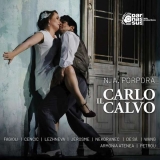Der neapolitanische Komponist Nicola Antonio Porpora (1686-1768) schrieb mehr als sechzig Opern. Seine Opera seria Carlo il Calvo aus dem Jahr 1738 basiert auf dem Leben Karls des Kahlen (Enkel Karls des Großen) und war für das Teatro delle Dame in Rom bestimmt war.
In der Programmnotiz dieser Produktion aus dem Markgräflichen Opernhaus Bayreuth steht: « Die Handlung führt also in jene Epoche des frühen Mittelalters, als das Europa Karls des Großen wegen seiner zerstrittenen Erben zerfiel. Ihre Besonderheit besteht darin, dass der Titelheld ein Kind ist. Lothar der Deutsche, sein Stiefbruder, Enkel Karls des Großen, entführt den rechtmäßigen Thronerben, um ihm die Herrschaft zu entreißen. Das gibt Karls Mutter Gelegenheit zu herzzerreißenden Verzweiflungsszenen und atemberaubenden Gefühlsausbrüchen. Eine Paraderolle für die russische Starsopranistin Julia Lezhneva. Den durch einen falschen Berater zum Bösen verführten Lottario verkörpert Max Emanuel Cencic in pathologischer Hysterie. Allein Franco Fagioli hat als edler Ritter Adalgiso das Zeug, dem Tyrannen Einhalt zu gebieten und die gottgewollte Ordnung wiederherzustellen. »
Porporas Kompositionskunst ist in diesem Werk auf ihrem Zenith. Die Arien und Ensembles sind äußerst ausgefeilt und technisch herausfordernd.
Die Sopranistin Julia Lezhneva ist eine herausragende Gildippe, die nicht nur in den Bravourarien fasziniert, sondern auch die Figur dieser von zwiespältigen Gefühlen geleiteten Frau glaubhaft darstellt.
Franco Fagioli singt einen brillanten Adalgiso, und seine Koloraturen sind atemberaubend. Max Emanuel Cencic ist nicht weniger bewundernswert als Lottario. Der wunderbare Sopran von Suzanne Jerosm gibt der Giuditta viel Charakter, und Bruno de Sà (Berardo) betört mit geradezu ätherischem Gesang. Auch die übrigen Rollen sind vorzüglich besetzt, und das ganze Ensemble bietet mithin eine herausragend gute Interpretation von Porporas faszinierender Musik. Das ist barocke Gesangskunst auf höchstem Niveau.
George Petrou und seine Armonia Atenea unterstützen die Sänger mit einem lebhaften, klar strukturierten und immer transparenten Orchesterspiel, das die dramatischen Wendungen der Oper packend wiedergibt.
The Neapolitan composer Nicola Antonio Porpora (1686-1768) wrote more than sixty operas. His opera seria Carlo il Calvo from 1738 is based on the life of Charles the Bald (grandson of Charlemagne) and was intended for the Teatro delle Dame in Rome.
The program note for this production from the Margravial Opera House in Bayreuth states, « The plot thus takes us to that epoch of the early Middle Ages when Charlemagne’s Europe was falling apart because of his quarreling heirs. Its peculiarity is that the title hero is a child. Lothar the German, his stepbrother, grandson of Charlemagne, kidnaps the rightful heir to the throne in order to wrest rule from him. This gives Charlemagne’s mother the opportunity for heartbreaking scenes of despair and breathtaking outbursts of emotion. A parade role for the Russian star soprano Julia Lezhneva. Lottario, seduced to evil by a false advisor, is embodied in pathological hysteria by Max Emanuel Cencic. Franco Fagioli alone, as the noble knight Adalgiso, has what it takes to put a stop to the tyrant and restore Godly order. »
Porpora’s compositional art is at its zenith in this work. The arias and ensembles are extremely polished and technically challenging.
Soprano Julia Lezhneva is an outstanding Gildippe, not only mesmerizing in the bravura arias but also believably portraying the character of this woman guided by conflicting emotions.
Franco Fagioli sings a brilliant Adalgiso, and his coloratura is breathtaking. Max Emanuel Cencic is no less admirable as Lottario. Suzanne Jerosm’s wonderful soprano gives Giuditta plenty of character, and Bruno de Sà (Berardo) beguiles with almost ethereal singing. The other roles are also excellently cast, and the entire ensemble offers an outstandingly good interpretation of Porpora’s fascinating music. This is baroque vocal art at the highest level.
George Petrou and his Armonia Atenea support the singers with a lively, clearly structured and always transparent orchestral playing that renders the dramatic twists and turns of the opera grippingly.
























